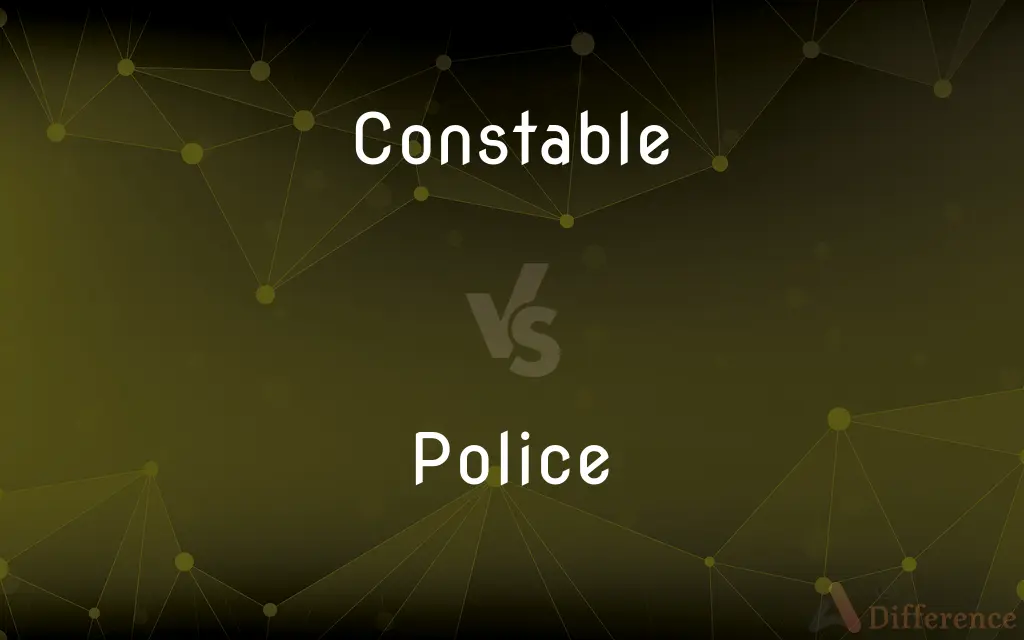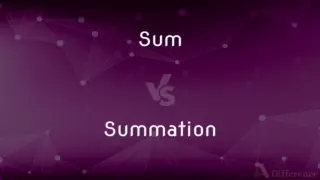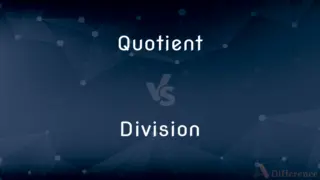Constable vs. Police — What's the Difference?
By Tayyaba Rehman & Urooj Arif — Updated on April 2, 2024
A constable is a law enforcement officer with specific duties and jurisdiction, while "police" refers to the broader organization of individuals charged with maintaining public order and safety.

Difference Between Constable and Police
Table of Contents
ADVERTISEMENT
Key Differences
Constables are a type of police officer, typically with particular duties, powers, and a jurisdiction defined by statutes or common law. They may serve in a specific area, like a town or county, and their roles can range from serving court documents to enforcing minor criminal laws and traffic regulations. On the other hand, the term "police" encompasses all members of a police force or department, including constables, sergeants, detectives, and other law enforcement personnel. The police are responsible for preventing crime, enforcing laws, and maintaining public order and safety.
While constables often have specific responsibilities that may include tasks like court security, process serving, and executing warrants, police officers generally have a broader range of duties that can vary significantly from one jurisdiction to another. For example, police duties include patrolling, investigating crimes, making arrests, and providing emergency assistance.
The authority and operational scope of constables can vary widely by country and within countries. In some regions, constables are elected officials with limited law enforcement powers, whereas in others, they are full-fledged police officers with comprehensive authority. In contrast, police forces are structured organizations with a hierarchy and a wide range of roles tailored to the complex needs of law enforcement and public service.
Training and qualifications for constables versus other police officers can differ significantly. Constables might be required to complete specific training relevant to their duties, which could be less comprehensive than the full training program police officers undergo. However, in some jurisdictions, constables receive the same training as other police officers, reflecting the diversity of the role across different legal systems.
The relationship between constables and the broader police force highlights the varied nature of law enforcement structures. While constables are part of the police system, their roles, powers, and responsibilities are distinct, often reflecting historical or local law enforcement traditions.
ADVERTISEMENT
Comparison Chart
Definition
A law enforcement officer with specific duties and jurisdiction.
Refers to the collective organization of individuals tasked with law enforcement and public safety.
Duties
May include serving court documents, enforcing laws, and traffic regulations.
Encompass a broader range of responsibilities including crime prevention, investigation, and public safety.
Authority
Varies widely; can be limited to specific tasks or equivalent to full police powers.
Generally have broad authority for law enforcement within their jurisdiction.
Training
Can vary; may be specific to their duties or equivalent to full police training.
Typically undergo comprehensive training for a broad range of law enforcement tasks.
Relationship
A type of police officer with a specific role within the law enforcement system.
The broader entity that includes various ranks and types of law enforcement officers, including constables.
Compare with Definitions
Constable
May have specialized duties.
As a constable, her main duty is to ensure the safety of the courthouse.
Police
Enforce laws and maintain public order.
The police arrived quickly to deescalate the situation.
Constable
A designated law enforcement officer.
The constable served the court summons efficiently.
Police
Essential for community safety.
The police hosted a community meeting to discuss safety concerns.
Constable
Operates within specific jurisdictions.
The local constable has authority in this town.
Police
Includes various ranks and roles.
She aspires to join the police as a detective.
Constable
Training varies by role.
He completed the required training to become a constable.
Police
Undergoes comprehensive training.
Police academy training prepares officers for a wide range of challenges.
Constable
Part of the police system.
Constables play a crucial role in our community policing strategy.
Police
Broad jurisdiction and duties.
Local police are investigating a series of burglaries.
Constable
A constable is a person holding a particular office, most commonly in criminal law enforcement. The office of constable can vary significantly in different jurisdictions.
Police
The police are a constituted body of persons empowered by a state, with the aim to enforce the law, to ensure the safety, health and possessions of citizens, and to prevent crime and civil disorder. Their lawful powers include arrest and the use of force legitimized by the state via the monopoly on violence.
Constable
A peace officer with less authority and smaller jurisdiction than a sheriff, empowered to serve writs and warrants and make arrests.
Police
A body of government employees trained in methods of law enforcement and crime prevention and detection and authorized to maintain the peace, safety, and order of the community.
Constable
A medieval officer of high rank, usually serving as military commander in the absence of a monarch.
Police
A body of persons with a similar organization and function
Campus police. Also called police force.
Constable
The governor of a royal castle.
Police
(Archaic) Regulation and control of the affairs of a community, especially with respect to maintenance of order, law, health, morals, safety, and other matters affecting the public welfare.
Constable
Chiefly British A police officer.
Police
(Informal) A group that admonishes, cautions, or reminds
Grammar police.
Fashion police.
Constable
One holding the lowest rank in most Commonwealth police forces. (See also chief constable.)
Police
The cleaning of a military base or other military area
Police of the barracks must be completed before inspection.
Constable
A police officer or an officer with equivalent powers.
Police
The soldiers assigned to a specified maintenance duty.
Constable
(historical) An officer of a noble court in the Middle Ages, usually a senior army commander. (See also marshal).
Police
To regulate, control, or keep in order with a law enforcement agency or other official group.
Constable
The warden of a castle.
Police
To impose one's viewpoint or beliefs regarding, especially in an authoritarian way
Policing others' comments by implementing speech codes.
Constable
(US) An elected or appointed public officer, usually at municipal level, responsible for maintaining order or serving writs and court orders.
Police
To critique in a presumptuous or arrogant manner
Policed the grammar of everyone who commented on the blog post.
Constable
(Channel Islands) An elected head of a parish (also known as a connétable)
Police
To make (a military area, for example) neat in appearance
Policed the barracks.
Constable
A large butterfly, Dichorragia nesimachus, family Nymphalidae, of Asia.
Police
A public agency charged with enforcing laws and maintaining public order, usually being granted special privileges to do so, particularly
Call the police!
Constable
To act as a constable or policeman.
Police
A department of local (usually municipal) government responsible for general law enforcement.
The Sheriff's Department has jurisdiction across most of Chicago but focuses on the unincorporated area and tasks like prisoner transport, leaving the rest to the Chicago Police Department.
Constable
A high officer in the monarchical establishments of the Middle Ages.
Police
(UK) A branch of the Home Office responsible for general law enforcement within a specific territory.
Constable
An officer of the peace having power as a conservator of the public peace, and bound to execute the warrants of judicial officers.
Police
Any of the formally enacted law enforcement agencies at various levels of government.
Constable
A lawman with less authority and jurisdiction than a sheriff
Police
The staff of such a department or agency, particularly its officers; an individual police officer.
Constable
English landscape painter (1776-1837)
Police
People who try to enforce norms or standards as if granted authority similar to the police.
Who called the fashion police?
Constable
A police officer of the lowest rank
Police
Cleanup of a military facility, as a formal duty.
Police
Synonym of administration, the regulation of a community or society.
Police
(obsolete) policy.
Police
(obsolete) polity, civilization, a regulated community.
Police
(transitive) To enforce the law and keep order among (a group).
Extra security was hired to police the crowd at the big game.
Police
To clean up an area.
Police
To enforce norms or standards upon.
To police a person's identity
Police
A judicial and executive system, for the government of a city, town, or district, for the preservation of rights, order, cleanliness, health, etc., and for the enforcement of the laws and prevention of crime; the administration of the laws and regulations of a city, incorporated town, or borough.
Police
That which concerns the order of the community; the internal regulation of a state.
Police
The organized body of civil officers in a city, town, or district, whose particular duties are the preservation of good order, the prevention and detection of crime, and the enforcement of the laws.
Police
Military police, the body of soldiers detailed to preserve civil order and attend to sanitary arrangements in a camp or garrison.
Police
The cleaning of a camp or garrison, or the state a camp as to cleanliness.
Police
To keep in order by police.
Police
To make clean; as, to police a camp.
Police
The force of policemen and officers;
The law came looking for him
Police
Maintain the security of by carrying out a control
Common Curiosities
Is training different for constables compared to other police officers?
Training can vary, with some constables receiving specialized training relevant to their duties, while others undergo the same training as full police officers.
What does "police" refer to?
"Police" refers to the collective body of individuals authorized to enforce laws, maintain public order, and ensure community safety.
How do constable duties differ from other police officers?
Constable duties are often more specific and can include tasks like serving legal documents, court security, and executing warrants, unlike broader police duties.
What are the main responsibilities of the police?
The police are responsible for enforcing laws, preventing crime, investigating criminal activities, and ensuring public safety.
What is a constable?
A constable is a law enforcement officer with specific duties, jurisdiction, and authority, which can vary significantly depending on the location.
Can a constable have the same powers as a regular police officer?
In some jurisdictions, yes, constables have the same law enforcement powers as regular police officers; in others, their powers are more limited.
Can the role of a constable change over time?
Yes, the role and authority of constables can evolve due to changes in legislation, community needs, or law enforcement practices.
How is the authority of a constable determined?
A constable's authority is usually defined by statute, common law, or local regulations, and can vary widely by jurisdiction.
How do constables contribute to community safety?
Constables contribute by performing specific law enforcement tasks, supporting the broader efforts of the police to maintain order and safety.
What impact do constables have on the legal system?
Constables play a vital role in the legal system by ensuring the enforcement of court orders, security, and the execution of legal documents.
Are constables part of the police force?
Yes, constables are considered part of the broader police force, though their specific roles and responsibilities may differ.
How do the roles of constables differ internationally?
Internationally, the role of a constable varies widely, with differences in duties, powers, and training reflecting local law enforcement traditions.
What challenges do constables face in their duties?
Constables face challenges such as dealing with difficult or dangerous situations, ensuring compliance with legal processes, and adapting to changes in law enforcement practices.
Is the position of a constable elected or appointed?
This depends on the jurisdiction; constables can be either elected or appointed, with variations in their selection process and term length.
Do constables work independently or as part of a team?
Constables can work independently, particularly when performing specific duties, or as part of a law enforcement team, depending on their role.
Share Your Discovery

Previous Comparison
Sum vs. Summation
Next Comparison
Quotient vs. DivisionAuthor Spotlight
Written by
Tayyaba RehmanTayyaba Rehman is a distinguished writer, currently serving as a primary contributor to askdifference.com. As a researcher in semantics and etymology, Tayyaba's passion for the complexity of languages and their distinctions has found a perfect home on the platform. Tayyaba delves into the intricacies of language, distinguishing between commonly confused words and phrases, thereby providing clarity for readers worldwide.
Co-written by
Urooj ArifUrooj is a skilled content writer at Ask Difference, known for her exceptional ability to simplify complex topics into engaging and informative content. With a passion for research and a flair for clear, concise writing, she consistently delivers articles that resonate with our diverse audience.













































